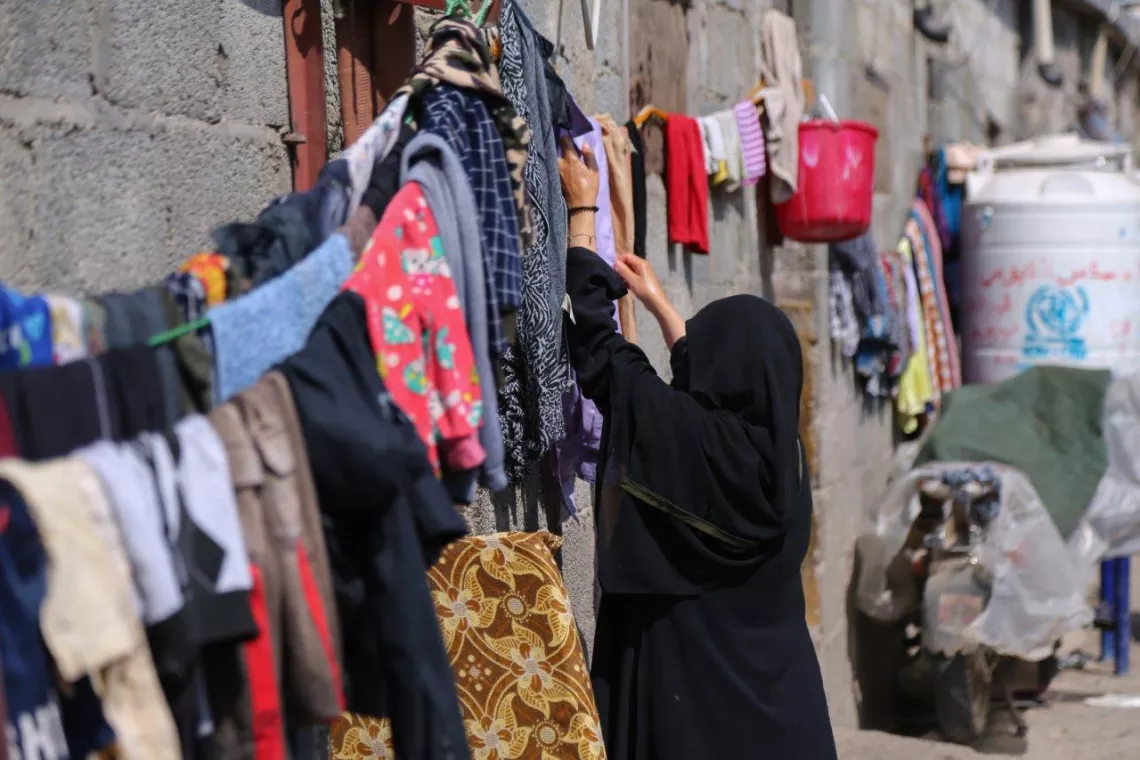Yemen’s Water Supply: The Difference between Life and Death for the Nation’s Vulnerable Population
UNICEF supplied and installed five water pumps for five wells in some of the country’s most under-resourced areas

- Available in:
- English
- العربية
“Now that we have the water we need within our community, joy has returned to my children’s faces. They get to be children again, rather than having to spend the day in search of water and clinging to life,” says Faisal Hammoud Hassan Al-Jabri.
A protracted war, mass displacement, and a lack of clean drinking water have slowly deteriorated living conditions and, with that, the glimmer of hope and normalcy that many Yemenis were holding on to.
UNICEF supplied and installed five water pumps for five wells in some of the country’s most under-resourced areas – including Al Sahool, Al Mashannah, and Al Dhihar areas in Ibb governorate, in addition to rehabilitating 12 wells in Al Mashannah, Al Dhihar, and Jiblah.
Returning to School
A father of eight, Faisal Hammoud Hassan Al-Jabri, 42, was forced out of Sa’ada governorate because of the war. Given the water shortage in his adopted home of Ibb, his children were unable to maintain their personal hygiene or clean their clothes, and even stopped attending school.
In Faisal’s words: “My children, and other children in the community, were often unable to wash their faces due to the lack of water. Our lives were filled with diseases, poverty, and filth, so we had to travel to remote locations to search for (or buy) the water we needed just to get by. Now that we have the water we need within our community, joy has returned to my children’s faces. They get to be children again, rather than having to spend the day in search of water and clinging to life.”
The Most Precious Thing
Now that he can access clean water in his camp, Aiz Al-Din, 11, has been able to move forward from his feelings of estrangement and displacement:
“I’ve learned that water is the most precious thing in life, and I have started to love staying in the camp now that I can access it.”

Clean Water and COVID-19
More broadly, access to clean water has helped some of the most vulnerable Yemenis to stave off the COVID-19 pandemic.
A mother of seven, Jamala Ali Fares, 38, had to flee the city of Taizz to the Al-Salam camp in Ibb governorate. Soon after their arrival, her children were unable to attend school because of the water-borne diseases they contracted from fetching water in plastic jerry cans.
Jamala explains: “The camp’s children and adults were stricken by bacteria, amoebas, and diarrhea from the unclean liquid we were forced to drink. Fortunately, once we gained access to potable water, the diseases disappeared, children returned to school, and we now have water that we can consume and use to clean. I think the simple reason we’ve been spared from the COVID-19 pandemic is that we have water we can use to wash our hands and clean our houses.”
“I am so happy.”
With a broad grin, Karim, 8, shared how much his life has changed since the Water, Sanitation and Hygiene program was put in place: “Before we had water, we could rarely take a bath. I am so happy now. Water is the most beautiful thing in life, and I play in it and enjoy it every day.”
Series of Projects
Salim Hassan Hadi, Director-General of Ibb governorate’s Local Water and Sanitation Corporation, UNICEF implementing partner, describes a series of projects that UNICEF supported.
“There were only two wells, one with a 9-liter capacity and another with only 3 liters. Because of the water crisis, the collapse in water levels, and dried up wells, water distribution used to take place every two months.
Now, it is being distributed every week. Five wells have been drilled, some of them have the capacity to generate 20-40 liters of potable water per second.”

After UNICEF rehabilitated the wells, it supplied six water pumps that reached over a million residents and internally-displaced persons (IDP). In turn, the Water Corporation has drilled other wells and formed a COVID-19 response team to protect residents from the pandemic, chlorinate water, and disinfect hospitals, local markets, prisons, schools, and IDP camps.
Restoring Life
The Technical Director of the Water Corporation, Ahmad Al-Darwish, 41, reported that this project has made up for the water shortage of the wells: “Thanks to the 12 wells that UNICEF rehabilitated and the six water pumps the organization supplied, the water has now reached our target number of residents.
This project has eliminated the diseases and epidemics that were rampant due to water scarcity and contamination. In a word, it has brought life back to the city, its residents, and farmlands.






